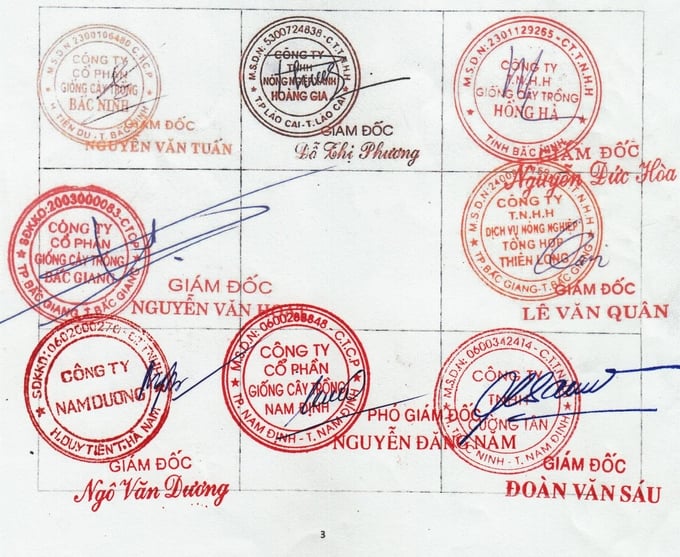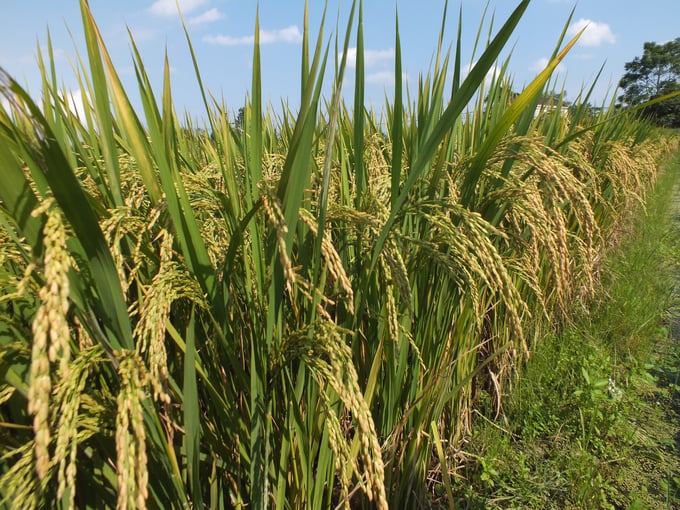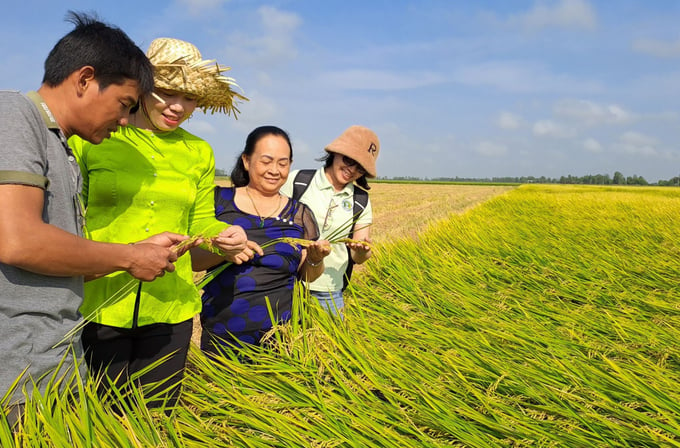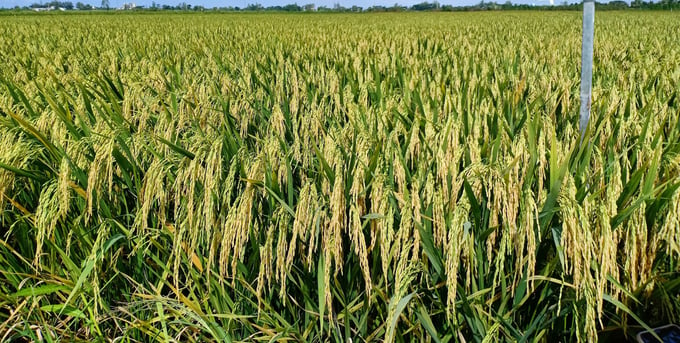November 27, 2025 | 22:04 GMT +7
November 27, 2025 | 22:04 GMT +7
Hotline: 0913.378.918
November 27, 2025 | 22:04 GMT +7
Hotline: 0913.378.918
A petition has been submitted to the Minister of Agriculture and Rural Development (MARD) requesting the removal of obstacles hindering the implementation of the Law on Crop Production.
A petition has been submitted by businesses involved in the production and trading of seeds in northern plants to the Minister of Agriculture and Rural Development (MARD) and the Department of Crop Production. The petition urges the consideration and resolution of obstacles and deficiencies in production and trading operations related to the implementation of the Law on Crop Production.

The enterprises jointly submitted a petition to the Minister of Agriculture and Rural Development Le Minh Hoan and the Department of Crop Production.
The petition brings attention to the Northern plant seed businesses being presented:
"Over the past few months, there has been a notable increase in the sense of anxiety and insecurity among individuals as the summer-fall and seasonal crops approach. This is due to conflicts arising between the implementation of the Law on Crop Production and the Vietnam Intellectual Property Law.
The primary focus of our concern pertains to the insufficiencies and inconsistencies of the legislation governing crop cultivation in relation to other legal and regulatory frameworks.
Despite several meetings and conferences held between management agencies and the Vietnam Seed Trade Association, as well as seed production and trading businesses, the practical implementation of these discussions remains complex and challenging, with no clear solution in sight.
The extension of the grant of the plant variety patent encompasses unprotected rice and maize varieties, listed as permitted varieties for production and trading. These varieties include Xi21, Xi23, CR203, Q5, Khang Dan, Huong, Bac Thom 7, Nep 97, Ai 32, DV-108, and others. Additionally, hybrid rice varieties such as Nhi uu 838, Nhi uu 63, and San uu, and maize varieties like LVN-10 are also included in the extension.
The aforementioned varieties are considered resources of the state and were subject to research, selection, and importation by institutes under MARD, state-owned enterprises, and the National Center for Variety Evaluation and Seed Certification, among other entities.

Recently, many businesses have commented on the shortcomings when implementing the Law on Crop Production.
For several years, these cultivars have been cultivated and traded, and have received endorsement from various seed production enterprises in the northern, central northern, and Central Highlands regions. These cultivars are significant drivers of production and have been socialized.
According to the Law on Crop Production, it is mandatory for all unprotected socialized varieties to extend the grant of the plant variety patent if they wish to sustain their production and business operations. The issue at hand is:
Initially, I would like to inquire about the number of plant varieties that have been granted a patent extension as of April 22, 2023. At present, plant varieties that have not received an extension of their patent grant under the Crop Production Law are prohibited from being circulated. The extant varieties are currently available, what is the appropriate protocol for their management in the course of production? How can farmers in high demand acquire seeds for production? Several seed businesses have failed and subsequently ceased operations, resulting in a stagnant workforce.
Secondly, with regards to crop varieties that have been granted circulation rights by either organizations or individuals, encompassing both protected and non-protected varieties as per the Law on Crop Production, only the aforementioned entities possess the authority to engage in circulation activities such as production and business operations or to delegate such rights to other organizations and individuals. This stands in sharp contrast to the cultivars safeguarded by the legal framework of Intellectual Property.
MARD has expressed its support for upcoming businesses by advocating for the removal of barriers. This will enable businesses to continue producing and trading socialized varieties without requiring permission from any individual or organization during the current season and year. The present study aims to develop a comprehensive strategy for financing non-recurring costs incurred by entities and individuals who have been granted an extension of the plant variety patent by the agricultural extension fund or have made contributions through the Vietnam Seed Trade Association.

Businesses said that the implementation of the Law on Crop Production encountered problems with the provisions of the National Intellectual Property Law.
It is anticipated that in the future, there will be a complete cessation of the extension of the grant of the plant variety patent for the primary plant variety included in the roster of varieties authorized for production and commerce. This will apply to varieties that are not safeguarded by intellectual property rights or whose protection period has lapsed, resulting in their release, similar to the conclusion of the protection period.
It is recommended that the extension of the grant of the plant variety patent should be limited to those varieties that have been safeguarded and are currently within the protected duration.

Enterprises proposed to soon have solutions to remove and facilitate production and business activities.
These proposals aim to prevent the disposal of varieties and maintain their inclusion in the list of approved varieties for production and commerce. This will enable organizations and individuals to lawfully engage in the production and trade of these varieties. Farmers possess high-quality seeds that they utilize as per demand. Certain seed varieties may not be produced for a specific duration, but are later reintroduced into production. Farmers will dispose of unproductive cultivars that fail to meet the specified criteria. Simultaneously, it satisfies the criteria outlined in the Vietnam Intellectual Property Law and does not contravene the regulations stipulated in the Law on Crop Production.
Translated by Linh Linh

(VAN) On November 27, in the meeting with Minister Tran Duc Thang, Mayor Yin Yong shared Beijing’s experience to improve environment and air quality.

(VAN) After 30 years, both sides identified strategic areas of cooperation: sustainable production, increasing coffee value and training for farmers.
/2025/11/27/4910-4-164708_294.jpg)
(VAN) On the afternoon of November 27 in Beijing, Minister of Agriculture and Environment Tran Duc Thang held a working session with several major Chinese enterprises operating in the agriculture and environment sector.

(VAN) The Department of Animal Health issued a provisional guideline requesting local authorities to increase surveillance, collect samples for testing, and conduct epidemiological investigations according to the established procedure.

(VAN) The United Nations recommends that Vietnam utilize data and artificial intelligence to enhance early disaster warnings and reduce GDP losses by 3.2% in the context of climate change.

(VAN) On the morning of November 27 in Beijing, Minister Tran Duc Thang and the Deputy Commissioner General of the General Administration of Customs of China signed a protocol on fresh jackfruit exports.

(VAN) As floodwaters recede, a vast network of irrigation works across eastern Gia Lai is emerging in a state of severe disrepair, with extensive damage demanding urgent restoration ahead of the 2025-2026 winter-spring cropping season.